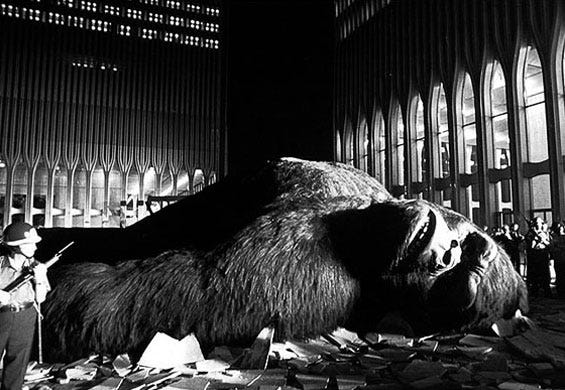In the end, even preternaturally large gorillas must face their mortality.
Having touched briefly on the Christian creation myth in the last instalment, I would like to return to it just as briefly to talk about storytelling. Storytelling seems to have been what our ancient ancestors used in lieu of information.
Creation myths exist almost universally throughout human culture and they are a good example of how literature fills the gaps of human knowledge. Certain things within the human experience are simply unknowable and, it tends to be those unknowable elements of our existence that stop us from sleeping properly.
As a man who prides himself on having moved past the Eighteenth century regretting only the loss of cottage industry I am able to see creation myth for what it is - literature. In The Bible, we are given the following information: that God created the world from the word. However, there is no explanation of what force created God. Most of the important back-story is absent: Was God ever a teenager? Did he ever strike out with a girl he did not particularly like in a bar in Birkenhead and spend the better part of a month moping about it? What is the nature of God (other than unknowable)? Why doesn't he have any friends of his own species? The Bible cannot address these questions because simply put, their answers are beyond the imagination of the storyteller.
However, science has not done much of a better job of explaining the back-story of the universe either. The big bang theory has a good deal of evidence to support it and I am certainly not qualified to dismiss it. However, at its core, it has the same problem as The Bible in those key story elements that are necessary for plot progression are missing. The big bang story starts with the universe as a small package of energy exploding, but it does not go very much detail about how the energy got there in the first place, how exploding matter creates consciousness or how the universe felt when it realised it was responsible for everything. Still, it has become the accepted place of science to explain the nature of the universe and, to document empirically the physical evolution from energy to matter and it has done so with such a high-level competence that we can now be almost certain that it is right. As great as a job as science is doing, it is those intangible questions about the why and when that we need literature for. Humanity needs literature as a buffer between the real and the intangible, it needs literature to provide a middle ground between the facts we have and the gaping lack of purpose that those facts give our lives.
Literature provides a psychological safety valve for the horrific certainties of the human condition. As a species, we are most defined by things we do not understand the purpose of. Take death, for instance, it is a certain reality of the human experience; yet whether or not dying negates the purpose of living is not something we are going to be able to make up our minds about. Thankfully, literature is there to help us in the form of monsters. In his book Into the Woods, screenwriter John Yorke argue that the metaphor of humanity versus monster carries itself into all storytelling (you can read an excerpt here).
Possibly the most popular monster in contemporary literature is the vampire. The vampire captures the human imagination because it helps us to accept our own deaths as natural. Immortal and eternally young, the vampire is the archetype of an innate human desire to be free from death. However, nothing that is free from death can be human and so the vampire is soulless and monstrous. It lives a shallow and meaningless existence and for all that it may look human, it can never be one. The existence of the vampire is woefully pointless, vampires from Dracula to Edward are incapable of attaining the simple happiness that most of us take for granted when eating buttered toast. Let alone finding a nice girl, settling down and having children. Then, there is zombies, immortality but as a rotting corpse. Given these entirely invented alternatives, death does not seem quite so terrible after all. That buffering between the real and the unknown, the physical and the invented is the highest purpose of literature.
What book are you reading right now? I bet it contains a buffer between the intangible reality. Is it Martha Wells' Condition Red with its cyborg protagonist, who through its separation from humanity and battle against human monsters, dissects and explicates the essence of what it means to be human. Perhaps it is The Grapes of Wrath where the brutality of economic depression cannot suffocate the innate survival instinct of the human race. Whatever it is that you are reading, it will provide a buffer between your humanity and the intangible threats to that humanity. Whether the monster is a tangible threat like Jaws, or (as with most romantic comedies) the protagonist's inability to behave as they are expected.
Of course, the buffer is not literature’s only purpose so I add the following disclaimer: I do not wish to detract from the persuasive and aesthetic values that literature possesses and once this very generalised introduction is finished I will look into all three of these purposes with a much greater level of scrutiny.

Comments
Post a Comment